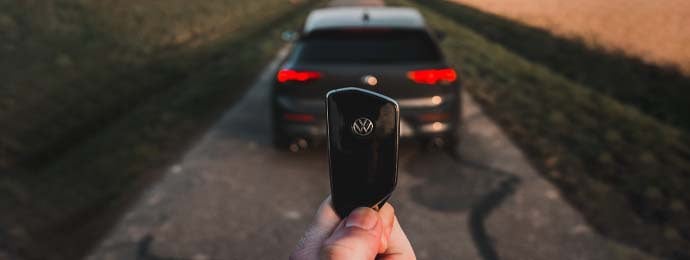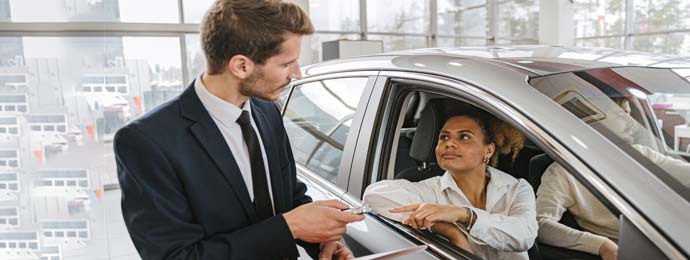Car Leasing Vs PCP
If you're looking for a brand new car, there are many options to acquire one, and it's hard to decide which one is best. With car leasing, you can benefit from low monthly payments relative to the value of the vehicle, whether you lease a car through Personal Contract Hire (PCH) contract or finance your next car with Personal Contract Purchase (PCP).

However, despite the similarities, there are significant differences between these two methods of getting a new car. If you're having trouble deciding which route to take, we have put together a Car Leasing vs PCP guide to help you choose which is right for you.
What is Car Leasing?
Leasing a car is essentially a long-term rental. Once you've chosen the vehicle you want, you usually have to make an upfront payment and regular monthly payments to use a car for several years, typically between 24-48 months. You then return the vehicle at the end of the lease and decide if you want to start a new lease, buy a car, or go without a car.
With car leasing, the finance provider owns the car, and the value of the vehicle is set at the start of the contract. Depending on which contract type you choose depends on whether you have the option to purchase the vehicle when the contract expires. This makes it one of the different car finance options available to consumers.
There are also charges with car leasing if there is any damage beyond fair wear and tear and a penalties if you exceed your pre-agreed mileage limit. Plus, it's not your problem if the car is worth less than expected due to depreciation at the end of the lease, as the leasing company takes the risk.
What is PCP?
Personal contract purchase (PCP), sometimes known as a personal contract plan, is a type of car financing for individuals buying on instalments. This kind of lease allows you to either purchase the car outright or return it to the financing company at the end of the contract after an initial deposit and a series of monthly payments that effectively cover the vehicle's depreciation.
Compared to a Hire Purchase arrangement, where your deposit and monthly payments cover the entire value of the vehicle, PCP makes payments more manageable. However, it also means that even after you've completed all of the PCP monthly payments, you still don't automatically own the vehicle.
If you want to own the car, you must make the large optional final payment at the end of the contract. Depending on the type of car and contract terms, this typically amounts to a third to half of the car's initial price. It is, therefore, best to prepare how you would pay for this from the beginning of the contract if you know you want to keep the automobile, though it is also possible to refinance this amount.
What is PCH?
Personal contract hire (PCH), also known as personal leasing, allows you to drive a new car over an agreed period of time and mileage. With a PCH agreement, you can afford a new vehicle without experiencing the significant value loss that comes with buying one outright. You can also include a vehicle maintenance contract for servicing, maintenance and repairs, allowing you to plan ahead for all your motoring expenses.
You will need to return the vehicle to the finance company at the end of your personal contract hire agreement as you do not have the choice to purchase the vehicle. The vehicle must be returned to the leasing company in a condition that complies with the BVRLA's fair wear and tear requirements to avoid being penalised.

Car lease vs PCP and how they work
Monthly payments for PCP finance and leasing are often cheaper than other types of finance. Hire Purchase or bank loan contracts, for example, will have higher monthly costs because they cover the total cost of the car, whereas PCP only covers a fraction of the overall cash price.
PCP or leasing could work out better for you than other types of finance if you're after the lowest possible monthly payments. However, it's important to consider that you don't own the car at the end of the contract. There's no option to own the vehicle with leasing, but it is possible to buy the car with PCP by making the large optional final payment.
Key difference between Leasing and PCP
When you lease a car, you agree to rent it for a fixed length of time and then return it at the end of the agreement. With PCP, you pay monthly instalments and then have the choice to either purchase the vehicle at the end of your contract for an extra fee or just return it to the dealership. These are just a couple of the different car finance options available.
Below we have listed the main differences between Leasing and PCP:
Car leasing (PCH)
- Typically, only offered on new cars
- Works like a long-term rental contract
- A good credit score is required
- Excess mileage and damage charges apply
- Initial rental payment is required
- Relatively low monthly payments
- Difficult and costly to end the agreement early
- Car must be returned at the end of the contract, no option to own the vehicle
PCP finance
- Available for new and used cars
- Mileage and damage charges apply
- No-deposit options are often available
- Relatively low monthly payments
- Early termination is available at an additional cost
- Option to return or buy the car at the end
Still have a question about car leasing?
Call Nationwide Vehicle Contracts on 0345 811 9595 to speak to one of our experienced advisers to find the right new car lease deal for your needs.
Guide Information
Originally published: 21st September 2022
Last updated: 21st September 2022
